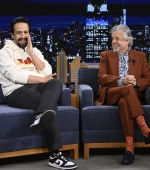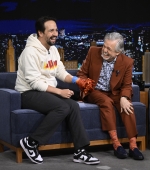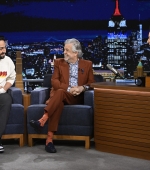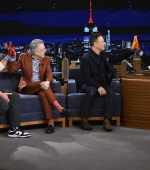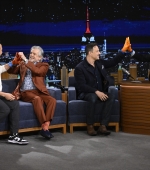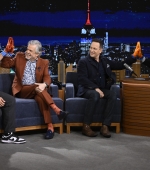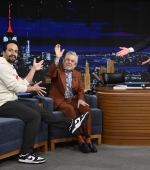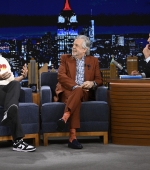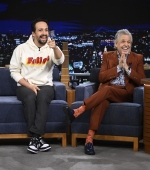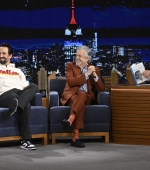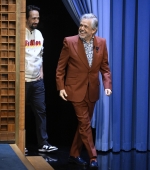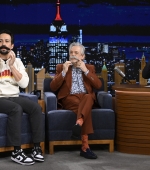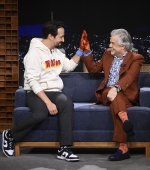In a long chat with British GQ, Lin-Manuel Miranda talks about the Hamilton movie, but also about how he is coping with the quarantine life and the projects he is working on at the moment.

In his head, Lin-Manuel Miranda has an alternative timeline of what he would be doing right now. The 40-year-old would have recently finished filming his directorial debut, for one, the Netflix adaption of the Broadway musical Tick, Tick… Boom!, which survived just ten days of shooting before everything shut down. Right now, he says, he should be in the edit.
Instead, he’s on a Zoom call, talking to GQ from his home about a filmed version of Hamilton, which wasn’t due out for another year, and he’s apologising for the fact that it doesn’t say “Lin-Manuel Miranda” on his screen, but “Lin-Sebastian’s dad”, as it “defaults to the time I did a parent-teacher conference”.
Hamilton, for those who’ve somehow missed one of the key cultural moments of the last decade, is the smash-hit Broadway musical that single-handedly made Broadway musicals cool. Written by and initially starring Miranda, it managed to do it, somewhat improbably looking back, by rapping about the Founding Fathers and specifically about a plucky upstart by the name of Alexander Hamilton.
The show itself was nominated for a record-setting 16 Tony Awards, winning eleven along with a Pulitzer, and made Miranda an instant superstar. He’s gone on to Hollywood leading roles – he played chimney sweep Jack in the 2018 Disney remake Mary Poppins Returns – along with seeing his debut musical, In The Heights, set for a big-screen adaption next year.
For now, it’s Hamilton that will be arriving on our screens, courtesy of Disney+. Recorded over two of Miranda’s last performances in the musical, it was rushed forward after lockdown struck. “Once it became clear there was not going to be any theatre for the foreseeable future,” he says, “we all kind of pivoted and said, ‘Oh, this is actually an opportunity to remind people of the power of theatre when there is none.’”
Check the full conversation under the cut.
GQ: First things first, how are you? How have you been coping in lockdown in this kind of new world that we now live in?
Lin-Manuel Miranda: I’m OK. I think it took me the first month just to get my head around what the world looked like. I was shooting a movie [Tick, Tick… Boom!]; I was making my directorial debut. We filmed ten days of coverage when the call came – we were already social distancing on set when Netflix shut down all their productions. So it was a month of inertia because, you know, after the enormous momentum that goes into planning, it was just figuring out the new reality and what kindergarten looked like for my son. It isn’t until very recently that I was able to have a creative life again and sort of start writing again, because your day is about what does the world look like? I have a five-year-old and a two-year-old, so they’re the day gone at 6am and it doesn’t start again until they’re asleep at 9pm.
Have you been able to start some creative work again then?
Well, on the alternate timeline – I feel like we all have an alternate timeline and what our year looks like… On that timeline I would have been filming Tick, Tick… Boom! through to the end of April and I’d be editing in post-production. I had some other writing projects that I was working on, but they were going to happen later. And so once it became clear that filming was not starting up any time soon, I began to work on those in earnest, yeah.
So, Hamilton is coming to Disney+, which is incredibly exciting – and a year earlier than planned. Talk me through how that decision was made.
We realised pretty early, even when the show was off Broadway, this is going to be a tough ticket. And we sort of realised there’s value in capturing what it feels like in the theatre with this company. And the three days we shot this film was the week before the principals started to leave. We all left the following Friday. So it’s the best rehearsed cast maybe in the history of movies – we were performing and what we’d spent a year doing. When lockdown happened we had around 75 per cent of it – enough of an original, a rough cut, to be able to sell it to Disney and partner with Disney. We didn’t have a final edit. We didn’t have a sound mix, which in a musical is pretty important. But once it became clear there was not going to be any theatre for the foreseeable future, we all kind of pivoted and said, “Oh, this is actually an opportunity to remind people of the power of theatre when there is none.” And so we got to editing and then it just became like racing. We turned in the final cut, like, two weeks ago.
How do you feel generally about the future for Broadway? Are you optimistic that it’s going to bounce back?
I’m optimistic. I’m not optimistic about any kind of timeline. Like I don’t know what theatre looks like on the other side of this, particularly in the absence of a vaccine. One of the books I’ve been reading during this lockdown is Will In The World, the biography of Shakespeare by Stephen Greenblatt. And I read it because I wanted to know what did Shakespeare do when the plague shut down the houses? Because there was that sort of meme going around, you know, “He wrote King Lear, what the fuck are you doing?” It’s not entirely accurate. He did write some sonnets. Those are pretty good. But it’s, you know, that uncertainty. When we make our calling where people gather, it’s a real one. And what I’m encouraged by is honestly the fact that given that there are no shows right now, it’s actually a time to tackle some of the more systemic issues with our theatre we need to talk about. How to get an audience for Hamilton that is as diverse as the cast on stage. We’re in talks, just for ourselves in this moment – at a time where we’re talking about systemic racism in the United States – on how to make backstage look more like on-stage; how to address some of the inequities when it comes to black folks and people of colour in the theatre industry. It’s still so predominantly white backstage and at the top, so I think we’re seeing people getting their houses in order because there’s time to do it and no one has the excuse that we’re very busy programming our season. So I can only speak for the Hamilton company, but we are hoping that when we come back, we come back into a world where we’re addressing some of these issues and we’re having the tough conversations.
Yourself and Hamilton are natural kind of bedfellows with the Black Lives Matter movement. But you did take a bit of criticism for not maybe speaking out early enough? Was that just an oversight?
Yeah, absolutely. And I called it a moral failure. And I stand by that, you know. I had been tweeting about Black Lives Matter since 2015. I remember us rehearsing “My Shot” for the first time when we heard the there was an acquittal for the police officers who murdered Eric Garner and how heavy that felt in the room and how we cried in the room. But for some reason, the moral blind spot is not bringing Hamilton and its social channels as a brand in alliance with that earlier. And so, you know, I think we’re making up for lost time in that regard. And you’re right, there are natural bedfellows. We are a company made up of black and brown actors who reckon with the origins of our country every night on stage.
This film, as you say, aims to bring the experience of watching Hamilton in the theatre to the screen. Have you had any discussions about a full-on movie adaption of it?
Not as many as you might think. Honestly, I feel like I hacked the system, because the fact that we have an incredible movie version of the live experience, that never happens. I’m so grateful that the thing I spent six years writing actually gets seen in a wider way. The act of adapting a movie adaptation is an act of translation to take you to acting – you’re making it a three-act thing. It’s been done with varying degrees of success. I’ve been on the other side of ten years of working on that with In The Heights. I think Jon Chu did an incredible job as anyone can do. But it’s not the show. It’s a movie. It’s a bigger movie than I ever dared dream. But it’s an act of translation. If I’ve learned anything, it is that the success or failure of a movie adaptation depends on the passion of its director. Jon Chu had that passion, while Rob Marshall had that passion with Chicago. And the movie version of Hamilton will require that passion.
Something that always stays in my head is when you hosted SNL just before the 2016 presidential election and you sang at a picture of Trump in the corridor “Never gonna be president”, which was so funny at the time but is hard to watch now. How do you look back on that?
The night before we’d heard the Access Hollywood tapes. I don’t think we’ve ever heard such vulgarity from a presidential candidate full stop. The fact that that was not career ending, I don’t know what that says. But whatever it says ain’t good. But, you know, it is unprecedented that a moment like that happened. And still millions of people said, “This is our guy.”
How are you feeling about the upcoming election?
I am feeling… I don’t know. I’m feeling uncertain, as everyone else is. I think people are certainly energised. I think there is a lot of… I think a lot of what you’re seeing in the streets and in the world is the country really loudly saying, “This guy does not speak for us” and “The integrity of our voting system is more important than ever.” And that’s a big concern of mine. But I have no doubts that the majority of this country does not believe that this president speaks for them. It’s just a matter of that being reflected in the voting booth or in the mail and voting situation that we will probably find ourselves in. We’ve seen there’s no bottom. There’s no bottom to the guy’s actions. I feel positive that more people are speaking out. I feel positive seeing that the overwhelming majority of these protests have been powerful and peaceful and, like, with masks and people handing out sanitisers… I’ve seen the peaceful protests myself in my own neighbourhood. And none of that changes unless we actually dismantle the systems that set them up. You know, it has to be followed – the lip service has to be followed up by meaningful change. I’m encouraged when I see that Minneapolis is looking to reallocate those police funds to the community. I’m encouraged when I see action. It’s very easy to tweet, but much harder to dismantle these inequities.
So, I happen to be re-watching The Sopranos at the moment and was quite surprised to see a young Lin-Manuel Miranda pop up briefly, playing a busboy. What are your memories of doing that?
[Laughs] Every time that pops up on my Twitter feed, people go, “Lin-Manuel Miranda’s cameo!” I go, “Guys, it’s not a cameo! It was my first TV gig.” It happened between substitute teaching gigs that I was doing at the time. I was so green that you can see me look down at my mark for where to stop because I’ve never had a mark before. My memory mainly was honestly of the kindness of James Gandolfini. I was one of the last shots on the end of a long day for him. And we shot his coverage first. He would have been absolutely fine to go home after his side of the footage had been filmed, but he stayed – because I think he saw a little Puerto Rican guy shitting his pants at his first TV opportunity – and did his lines opposite me even though he was not in frame. And I’m grateful for that kindness, even all these years later, because, you know, I’m not even on the call sheet – I got two lines.
It made me wonder what your early days of auditions were like. It’s a fairly stereotyped role for you, playing a busboy. Did you have a lot of those?
Yes! And that’s why In The Heights exists. I didn’t want to play a busboy and I didn’t want to play a gang member. And I think it came to me earlier than most that no one was going to write my dream role. I loved musicals and all we had was West Side Story. And that’s a beautiful show, but it’s a dated show. And I just wanted to write the kinds of roles where we didn’t play busboys and we didn’t play janitors. And so a lot of my life in the theatre has just been trying to write what is missing. And so even when I was writing Hamilton, I didn’t know anything about the founders of this country. What hooked me in was that it was an immigrant narrative. This was the one guy who came from the Caribbean and had to work three times as hard to get half as far, and that’s a narrative I instinctively understand, because that’s what my father went through, and that’s what so many people in my neighbourhood go through. That’s what hooked me in and then I had to learn the other stuff. But, yeah, I mean, I think my writing career exists because there is so little representation for Latinos in theatre.
When you do carve out the time, can I ask what you’re writing at the moment?
I’m writing a new project with Disney Animation. I’m not allowed to tell you much about it other than I get to write new songs and I want to make those kids feel weightless. And now I have kids who love, you know, animated movies and musicals and I’m writing for them. Like, I don’t have a very clear mirror image of what that inner child was, but he wakes me up at 5am: “Live-action Aladdin, please.”
I guess everyone would want to know if you’re working on another stage show. Any ideas in the locker for that?
Yeah, but I can’t tell you. I mean, it’s weird, because I kind of messed it up because Hamilton had such a public birth, right? Like, I didn’t know the Obamas would call and say, “Do you have anything about America and can you perform it at this podium?” But I did. And so that that was the most public writing I’ve ever done, because I kind of showed everyone the ultrasound in 2009 and then I didn’t finish it until 2015. So I can’t write that way again, because the scrutiny on me is so much greater now. And, you know, the best idea to kill an impulse is to talk about it. But, yes, I’m writing some new things that I think would work nicely in the theatre and I have some time to do it.
OK, so without asking you to give the game away, can I ask how far you are through the writing process for it?
I’m writing the first three or four songs, which I’ll rewrite once I find out what it’s really about. You know, because you start thinking you know what it’s about and then if you get lucky in a place, it starts to tell you what it’s about. And you go, “Oh, shit, I thought I was writing it for this reason, but I’m really writing it for this reason.” So I’m writing the initial impulse songs right now and it’ll tell me how much I did.
